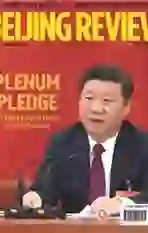Will China-U.S.Trade Disputes Diminish?
2016-05-14ByLanXinzhen
By Lan Xinzhen
A World Trade Organization (WTO) panel report pub- lished on October 19 has ruled that the United States violated WTO rules in 13 anti-dumping measures imposed on imports from China. Chinas Ministry of Commerce welcomed the ruling and urged the United States to respect the decision and rectify its trade remedies in order to ensure a fair international trade environment.
The complaint, filed by China in December 2013, involved various exports worth $8.4 billion annually. The ruling marks another trade dispute won by China against the United States under the WTO framework. Business people on both sides are hoping that fewer trade disputes between the two nations will arise from now on, and bilateral trade and economic relations will be less influenced by politics or certain interest groups in the United States.
At present, China and the United States boast close trade and economic ties: The United States is Chinas second largest trading partner, largest export market and fourth largest source of imports, while China is the United States largest trading partner. Two-way investment has continued to increase, and the United States is Chinas sixth largest source of foreign direct investment. By the end of last year, investment projects by U.S. businesses in China had reached 66,000 in number and $77.47 billion in value. The flow of investment in the other direction has also maintained sound growth momentum, with the United States being the fourth largest destination for Chinas overseas direct investment. By the end of 2015, investment by China-based enterprises in the United States had reached $46.6 billion.
Trade disputes, however, have often accompanied the two nations close economic ties. The frequent antidumping and countervailing investigations launched by the United States against China have hindered bilateral trade growth.
Such investigations usually take place under three sets of circumstances. First, they are launched with the mindset of trade protectionism. Amid its sluggish domestic economy, the United States erects trade barriers against products from China in order to protect domestic industries. Second, trade barriers are set up for political reasons. For instance, as policy toward China has become one of the focuses of U.S. presidential elections, the U.S. Government typically instigates trade investigations against China during election years in order to cater to voters. Third, investigations are initiated under pressure from interest groups, such as those launched against steel and tire imports from China under pressure from relevant trade associations.
In fact, the United States investigations targeting China not only harmed the interests of Chinese enterprises, but are also detrimental to U.S. businesses, bar those belonging to select interest groups. The measures have hiked import and production costs for U.S. companies, thereby hampering bilateral economic and trade relations and increasing living costs for people in the United States.
Given how interdependent their trade is, why do so many frictions between the two nations still occur? Various answers are forthcoming from both sides. Observers in China believe the United States purposefully refuses to acknowledge Chinas market economy status, restricts exports of hi-tech products to China and erects barriers to hinder companies from China investing in the United States in order to restrict Chinas development. U.S. observers, however, assert that China infringes upon U.S. intellectual property rights in bilateral trade and that direct investment by companies from China in the United States constitutes a threat to U.S. national security.
I dont want to judge the various claims, but one thing is certain—trade between the two sides should be conducted in accordance with WTO rules and regulations.
The recent case is not the only one China has won by resorting to WTO rules and regulations. China filed an appeal in April 2014 seeking to overthrow a ruling by a WTO panel that the United States Tariff Act Amendment was consistent with WTO rules. The act retroactively ratified U.S. anti-subsidy measures on non-market economy countries. The WTO ruled on July 7, 2014 that the 25 anti-dumping and countervailing investigations launched by the United States against China from 2006 to 2012 contravened WTO rules.
China deals with U.S. investigations under the WTO framework. Will the United States now rein in its investigations against China, and will trade disputes between the two diminish? Its hard to say, but we hope the answer will be in the affirmative.
China is set to acquire market economy status on December 11 this year, as the date marks 15 years since the nation joined the WTO. Chinas “non-market economy” status will no longer be an excuse for the United States to accuse China of dumping exports. Subsequently, the two nations trade disputes could drop substantially, which would benefit businesses and people on both sides.
